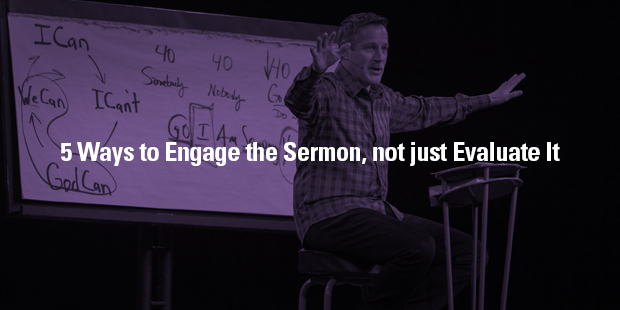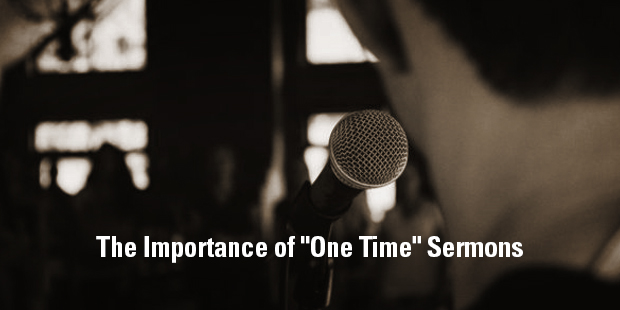
5 Ways to Engage the Sermon, not just Evaluate It
After the service what do you hear about the sermon? What do you read on social media?
- “It wasn’t deep enough.”
- “I loved the message, God spoke to me!”
- “Pastor Bob’s sermon from 1st Church was better, he connects better.”
- “That teaching was challenging and convicted me, thank you!”
- “It was boring and I didn’t get anything out of it.”
- “Pastor brought the heat, can’t wait for next Sunday!”
- “I really couldn’t listen, I’m not happy with the Pastor right now.”
If you have been part of a church for some time you’ve heard all these and more. It’s not a slam on the local church, it’s part of our humanity, but that doesn’t mean it’s all good.
There’s nothing wrong with some constructive criticism, in fact helpful critique is good. But there is a big difference between helpful critique and hurtful criticism about the Sunday sermon.
A pastor and close friend showed me the manuscripts of his sermons that one person in his church typed out every week, and marked all the grammatical errors, how many times he said the word “I,” and corrected his theology – all in red.
Yes, that’s extreme, but the art of evaluating the pastor’s sermon is at an all-time high. That’s why I’m eager to write these thoughts on moving away from evaluating the Sunday message to engaging it.
Most of my teaching is in the arena of spiritual and strategic leadership for church leaders, so I don’t personally get many of these sermon-oriented comments. But I coach the pastors that do, so I’m current and know how real the impact is.
I’m hoping this post helps us all stay focused on the purpose and value of a Sunday sermon.
Candidly, the Sunday message is designed for people’s spiritual growth, not their evaluation. There should be a small team in place to evaluate the sermon and help the pastor become a better communicator. Let them do that part.
Before we jump into a list of practical thoughts, let me offer three simple, “Please don’t do this, it’s hazardous to your spiritual health,” statements.
- Don’t allow your spirit to become critical, thereby lowering or possibly blocking your receptivity to God’s Word.
- Don’t compare your pastor to the dozens of other communicators you can hear online.
- Don’t think about all the other people who need to hear the sermon until it has changed you first.
Let me be very candid, there are some sermons that could have been better, I know, I’ve delivered a few of them. Thank God for people’s grace and my improvement over time.
However, I honestly believe that if you and I want to get something out of it, we can – every Sunday.
5 practices that will benefit your spiritual growth from the Sunday message:
1) Focus on the message not the messenger.
What is the main point of the sermon? What is God saying to you?
It’s easy in our current culture to assess and evaluate the speaker, and not necessarily in a mean or attacking way.
We are all evaluated, so we naturally evaluate. However, in the Sunday morning setting, evaluating the speaker is rarely helpful or productive.
If the pastor stumbles on a word or two, looks at the notes too often, has a unique speaking idiosyncrasy, etc., let it go. Let the designated team work on that.
Your sole focus is to engage the message in order to hear God’s voice with anticipation of an insight just for you. That takes us to the second practice.
2) Listen for insight more than entertainment.
I’ll quickly admit I love humor and communicators with a sense of humor. But I sometimes catch myself talking more about my favorite funny story than the spiritual insight that God meant for me.
Purposeful humor is a strong and desirable asset in a sermon, but entertainment isn’t the main thing the hearer should look for.
Enjoy the humor but seek the insight the Holy Spirit has for you, look for it. Look for what is new for you in that moment.
A biblical or spiritual insight can be new or a refresher, but either way it hits you as an “aha moment,” something relevant and meaningful to your life right then. Anticipate the aha moment.
3) Make it an act of worship more than education.
God teaches us through His Word, and that is always important, but information over transformation is not the point of the Sunday message.
16 All Scripture is God-breathed and is useful for teaching, rebuking, correcting and training in righteousness, 17 so that the servant of God may be thoroughly equipped for every good work.
2 Timothy 3:16-17
I thoroughly believe in biblical education, but there is something else, arguably larger, in play. It is the worship of God from the self-revelation of His Word.
Worship is the high calling for all Christians. As you listen to the message what does God reveal to you about his character, heart and will? What is He making known to you about who He is?
The more you know the one and true God the greater the depth and passion of your worship.
4) Engage the moment spiritually rather than remaining detached.
No one walks into church completely carefree. We are all distracted by the burdens we carry, the problems we face and the curve balls that life throws our way.
Yet, that 60 minutes or so of worship and teaching may be exactly what you need most. In fact, my hunch is that the more engaged you are the more you receive God’s guidance for you.
Worry, stress, and problems keep us distracted and detached when we desperately need to be engaged to what God is saying.
A great way to resist being detached and fully engage the moment is to not only seek what God is saying to you, but to be aware of what is happening in the room and pray for others.
For example, the pastor may be making a point that you sense a need to pray for others in that moment. Pay attention to what is happening in the spiritual realm and engage God in his work.
The Holy Spirit may put someone on your mind, pray for them right then! In this way you are actually entering into and aligning with what God is doing.
5) Pursue personal change over perfect content.
Spiritual growth is the purpose of your Sunday morning experience and your hearing of the message in particular.
There may be days where you just need comfort, wisdom or to sense the nearness and love of God. That’s good. But ultimately, the purpose is the development of your faith, spiritual maturity and to be transformed by the power of God.
Candidly, the content does not need to be perfect and polished for that change to take place. The power to change is up to God, the choice to change is up to you.
Yes, your pastor needs to work hard to be prepared, but in the end, God delivers what we need, then we choose if we will respond or not.
I’m often amazed at what people have said to me after I preach. (Besides “When is the senior pastor coming back?”)
They tell me about the thought that really helped them, challenged them, or was exactly what they needed in the moment. And that thought was nowhere in my notes, nor did I say it even once!
It is simply God at work speaking to the person who is fully engaged and seeks to change.

Tags: Dan Reiland, Sermon, engaging the sermon
















